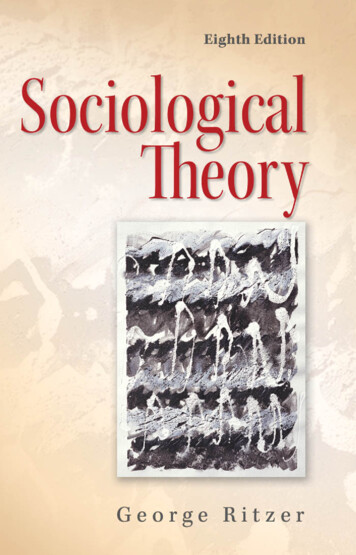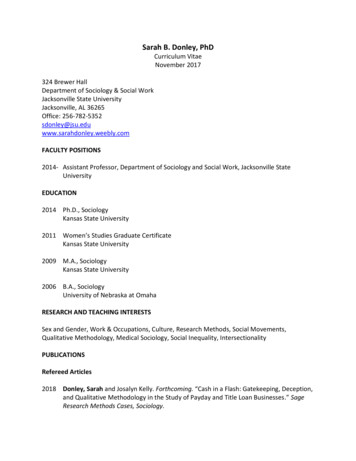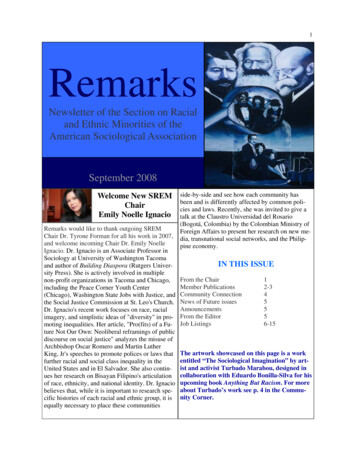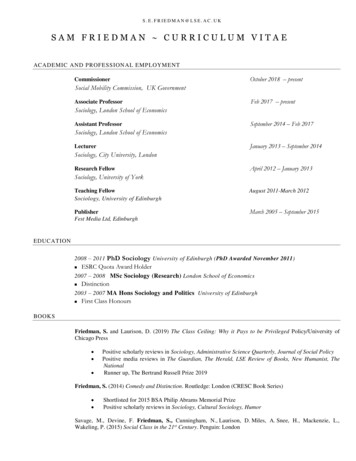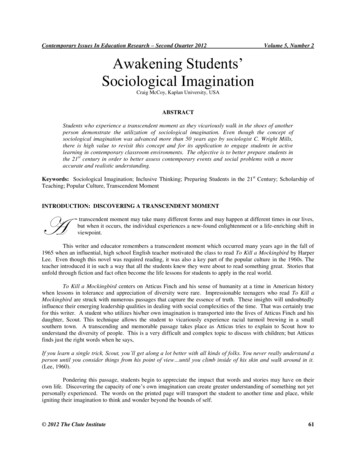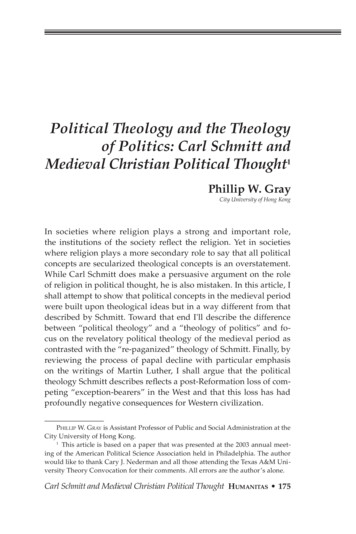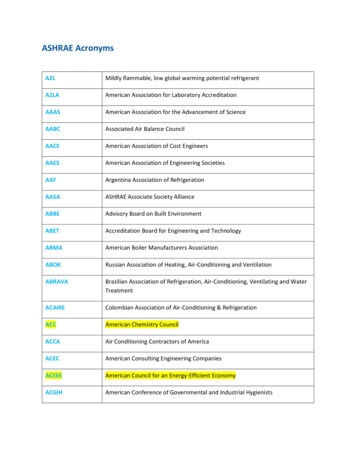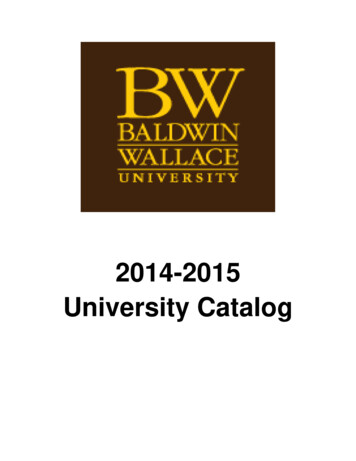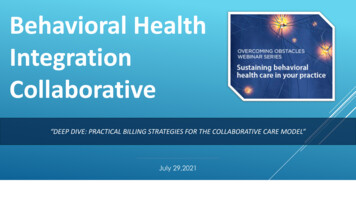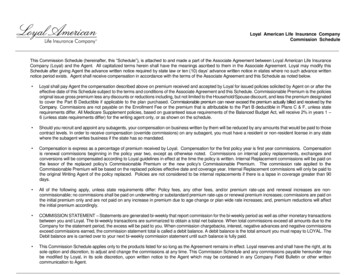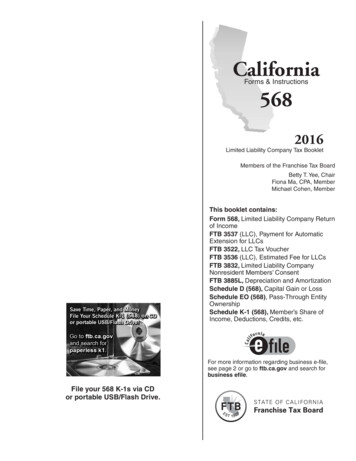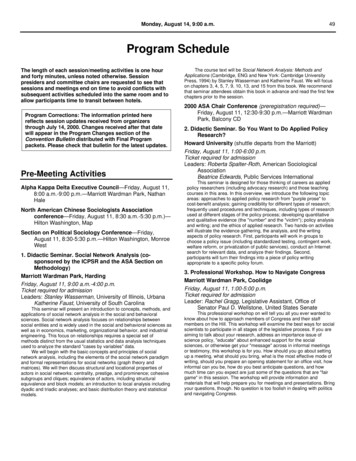
Transcription
Monday, August 14, 9:00 a.m.49Program ScheduleThe length of each session/meeting activities is one hourand forty minutes, unless noted otherwise. Sessionpresiders and committee chairs are requested to see thatsessions and meetings end on time to avoid conflicts withsubsequent activities scheduled into the same room and toallow participants time to transit between hotels.Program Corrections: The information printed herereflects session updates received from organizersthrough July 14, 2000. Changes received after that datewill appear in the Program Changes section of theConvention Bulletin distributed with Final Programpackets. Please check that bulletin for the latest updates.Pre-Meeting ActivitiesAlpha Kappa Delta Executive Council—Friday, August 11,8:00 a.m.-9:00 p.m.—Marriott Wardman Park, NathanHaleNorth American Chinese Sociologists Associationconference—Friday, August 11, 8:30 a.m.-5:30 p.m.)—Hilton Washington, MapSection on Political Sociology Conference—Friday,August 11, 8:30-5:30 p.m.—Hilton Washington, MonroeWest1. Didactic Seminar. Social Network Analysis (cosponsored by the ICPSR and the ASA Section onMethodology)Marriott Wardman Park, HardingFriday, August 11, 9:00 a.m.-4:00 p.m.Ticket required for admissionLeaders: Stanley Wasserman, University of Illinois, UrbanaKatherine Faust, University of South CarolinaThis seminar will present an introduction to concepts, methods, andapplications of social network analysis in the social and behavioralsciences. Social network analysis focuses on relationships betweensocial entities and is widely used in the social and behavioral sciences aswell as in economics, marketing, organizational behavior, and industrialengineering. This focus on relationships requires a special set ofmethods distinct from the usual statistics and data analysis techniquesused to analyze the standard "cases by variables" data.We will begin with the basic concepts and principles of socialnetwork analysis, including the elements of the social network paradigmand formal representations for social networks (graph theory andmatrices). We will then discuss structural and locational properties ofactors in social networks: centrality, prestige, and prominence; cohesivesubgroups and cliques; equivalence of actors, including structuralequivalence and block models; an introduction to local analysis includingdyadic and triadic analyses; and basic distribution theory and statisticalmodels.The course text will be Social Network Analysis: Methods andApplications (Cambridge, ENG and New York: Cambridge UniversityPress, 1994) by Stanley Wasserman and Katherine Faust. We will focuson chapters 3, 4, 5, 7, 9, 10, 13, and 15 from this book. We recommendthat seminar attendees obtain this book in advance and read the first fewchapters prior to the session.2000 ASA Chair Conference (preregistration required)—Friday, August 11, 12:30-9:30 p.m.—Marriott WardmanPark, Balcony CD2. Didactic Seminar. So You Want to Do Applied PolicyResearch?Howard University (shuttle departs from the Marriott)Friday, August 11, 1:00-6:00 p.m.Ticket required for admissionLeaders: Roberta Spalter-Roth, American SociologicalAssociationBeatrice Edwards, Public Services InternationalThis seminar is designed for those thinking of careers as appliedpolicy researchers (including advocacy research) and those teachingcourses in this area. In this overview, we introduce the following topicareas: approaches to applied policy research from "purple prose" tocost-benefit analysis; gaining credibility for different types of research;frequently used procedures and techniques, including types of researchused at different stages of the policy process; developing quantitativeand qualitative evidence (the "number" and the "victim"); policy analysisand writing; and the ethics of applied research. Two hands-on activitieswill illustrate the evidence gathering, the analysis, and the writingaspects of policy research. First, participants will work in groups tochoose a policy issue (including standardized testing, contingent work,welfare reform, or privatization of public services), conduct an Internetsearch for relevant data, and analyze their findings. Second,participants will turn their findings into a piece of policy writingappropriate to a specific policy forum.3. Professional Workshop. How to Navigate CongressMarriott Wardman Park, CoolidgeFriday, August 11, 1:00-5:00 p.m.Ticket required for admissionLeader: Rachel Gragg, Legislative Assistant, Office ofSenator Paul D. Wellstone, United States SenateThis professional workshop on will tell you all you ever wanted toknow about how to approach members of Congress and their staffmembers on the Hill. This workshop will examine the best ways for socialscientists to participate in all stages of the legislative process. If you areaiming to talk about your research, address an importance issue ofscience policy, "educate" about enhanced support for the socialsciences, or otherwise get your "message" across in informal meetingsor testimony, this workshop is for you. How should you go about settingup a meeting, what should you bring, what is the most effective mode ofwriting, should you prepare an opening statement for an office visit, howinformal can you be, how do you best anticipate questions, and howmuch time can you expect are just some of the questions that are "fairgame" in this session. The workshop will provide information andmaterials that will help prepare you for meetings and presentations. Bringyour questions, though. No question is too foolish in dealing with politicsand navigating Congress.
Monday, August 14, 9:00 a.m.50Honors Program Orientation—Friday, August 11, 1:30-5:30p.m.—Hilton Washington, CaucusCommittee on Publications—Friday, August 11, 2:00-5:30p.m.—Hilton Washington, Chevy ChaseSection on Undergraduate Education Council—Friday,August 11, 4:00-5:30 p.m.—Hilton Washington, C326ASA Journal Editors—Friday, August 11, 7:30-9:30 p.m.—Hilton Washington, Chevy ChaseHonors Program Roundtables—Friday, August 11, 7:309:30 p.m.—Hilton Washington, Jefferson WestSaturday, August 12The length of each session/meeting activities is one hourand forty minutes, unless noted otherwise. Sessionpresiders and committee chairs are requested to see thatsessions and meetings end on time to avoid conflicts withsubsequent activities scheduled into the same room and toallow participants time to transit between hotels.7:00 a.m.MeetingsSection on Aging and the Life Course Council Meeting (to8:15 a.m.)—Hilton Washington, IndependenceSection on Sociology of Culture Council Meeting (to 8:15a.m.)—Marriott Wardman Park, Park Tower 82178:30 a.m.Sessions4. Thematic Session. Latinos and RacismMarriott Wardman Park, Marriott Ballroom Salon 3Organizer and Presider: Hernan Vera, University ofFloridaProposition 187: A Case of Institutionalized Racism. JorgeBustamante, University of Notre DameLatino Racism: Overcoming Expressions of RacialAntagonism in Latino Communities. GilbertoCardenas, University of Notre DameAn Assessment of the Status of Latinos in Sociology:Minor Advances and Major Challenges. RogelioSaenz, Texas A&M UniversityDiscussion: Eduardo Bonilla-Silva, Texas A&M University5. Special Session. Old Boundaries and New Frontiers:The Challenges and Achievements of U.S. MuslimWomenMarriott Wardman Park, Virginia AOrganizer and Presider: Jen'nan Ghazal Read, University ofTexas, AustinEthnic Identity as a Challenge: Exploring the Boundaries ofGender, Race, and Religion. Kristine J. Ajrouch,University of MichiganThe Challenges of Being Poor, Muslim, and Female in anAmerican City. Louise Cainkar, University of Illinois,ChicagoThe Religious Tie: Gender, Identity and the Ambivalence ofAssimilation. Kathleen M. Moore, University ofConnecticutBehind the Veil, Beyond Veiling: Recent AnthropologicalObservations. Fadwa El Guindi, University of SouthernCaliforniaDiscussion: Yvonne Y. Haddad, Georgetown UniversityMeetingsASA Chairs Conference (to 2:10 p.m.)—Marriott WardmanPark, Balcony CDCommittee on Nominations (to 4:10 p.m.)—HiltonWashington, HamiltonCommittee on Publications (to 4:10 p.m.)—HiltonWashington, HemisphereHonors Program—Hilton Washington, State8:30 a.m.8:30 a.m.Other GroupsAKD Sociological Inquiry Editorial Board—Marriott WardmanPark, Park Tower 82096. Special Session. The Prison Industrial ComplexHilton Washington, Jefferson EastOrganizer and Presider: John Galliher, University of Missouri,ColumbiaThe War on Drugs and the Prison Industrial Complex. WilliamChambliss, George Washington UniversityRacism and the Prison Industrial Complex. David PatrickKeys, West Texas A&M UniversityPrivatization and the Prison Industrial Complex. YngvaDigernes, University of Missouri, ColumbiaDiscussion: James Austin, George Washington University7. Special Session. Politics and the Urban Context ofHomelessnessMarriott Wardman Park, Wilson BOrganizer: Leon Anderson, Ohio UniversityPresider: Mark LaGory, University of Alabama, Birmingham
Monday, August 14, 9:00 a.m.Space, Politics, and the Strategic Responses of theHomeless. David A. Snow and Michael Mulcahy,University of ArizonaOut of Sight—Out of Mind: Anti-Homeless Laws, Litigationand Alternatives in 50 United States Cities. KellyCunningham-Bowers, National Law Center onHomelessness and PovertyThe Social Control of Unhoused Persons. Mitch Duneier,University of Wisconsin, Madison, and University ofCalifornia, Santa BarbaraDiscussion: Leon Anderson, Ohio University8. Cancelled.9. Special Session. Continental Reorganization andSocial Relations in EuropeMarriott Wardman Park, Virginia COrganizer and Presider: Katherine O'Sullivan See, MichiganState UniversityExtending Boundaries and Managing New Inequalities in theEuropean Union. Barbara Schmitter Heisler, GettysburgCollege; and Martin Heisler, University of Maryland(Re)Organizing Women and Gender Relations inContemporary Russia. Valerie Sperling, Clark UniversityEngendering Ethnic Accommodation: Grassroots Organizingand the EU Programme on Peace and Reconciliation inNorthern Ireland. Linda Racioppi and KatherineO'Sullivan See, Michigan State University10. Special Session. The Sociology of School ChoiceMarriott Wardman Park, Maryland AOrganizers: Eric Rofes, Humboldt State University; and LisaM. Stulberg, University of California, BerkeleyIntroduction: Towards a Progressive Politics of SchoolChoice. Lisa M. Stulberg, University of California,BerkeleyThe Political Principal at Work: Charter Schools in LowIncome Communities of Color. Patty Yancey, Universityof San Francisco and American Institutes for ResearchSchool Choice through a Foucauldian Lens: DisruptingNeoliberal Discourses. Stacy Smith, Bates CollegeCharter Schools and Commmunity-Building: Opportunitiesand Limits. Marjorie D. Wilkes, West OaklandCommunity School and University of California,BerkeleyCharter Schools and the Legacy of Brown. John B. King, Jr.,Roxbury Preparatory Charter SchoolCharter Schools as Social, Economic, and Cultural Capital:Deepening Our Understanding of School Choice. EricRofes, Humboldt State University5111. Professional Workshop. Careers or Interludes inAcademic AdministrationMarriott Wardman Park, Delaware ALeaders: Jean Dowdall, A.T. Kearney Executive SearchCharles Keeley, Georgetown University12. Teaching Workshop. Teaching Medical SociologyHilton Washington, MapOrganizer: Diane R. Brown, Wayne State UniversityPresider: Tony Brown, University of MichiganTeaching Methods of Sociology and Health Policy forUndergraduates and Non-Majors. Larry Greil, AlfredUniversityUsing Technology Innovative and Methods in TeachingMedical Sociology. Eric R. Wright, Indiana UniversityEmerging Topics in Medical Sociology. William Cockerham,University of AlabamaThe goal of this workshop is to provide participants with usefulinformation and tools for teaching medical sociology to varied studentpopulations. The session will cover issues related to teaching medicalsociology to undergraduates and to non-sociology majors; the use oftechnology to enhance the understanding of medical sociology; inclusionof materials of the health and illness of multicultural/multiethnicpopulations; and emerging issues in medical sociology.13. Regular Session. Collective BehaviorMarriott Wardman Park, Wilson COrganizer: Benigno E. Aguirre, Texas A&M UniversityBetter Off by Doing Good: Why Anti Racism Must MeanDifferent Things to Different Groups. Ruud Koopmans,Wissenschaftszentrum Berlin fur SozialforschungWho Is That Wo(man) in the Street? From the Normalizationof Protest to the Normalization of the Protester. PeterVan Aelst and Stefan Walgrave, University of AntwerpGroup Size and Fatality Risk in a Fire Disaster. WilliamFeinberg and Norris R. Johnson, University of CincinnatiProtest and Violence in Greek Schools, with SpecialReferences to Upper Secondary Schools. Nicholas P.Petropoulos, A. Papastylianou, P. Katerelos, and K.Harisis, Pedagogic Institute, Athens, GreeceDiscussion: Robert A. Stalling, University of SouthernCalifornia14. Regular Session. FertilityHilton Washington, EdisonOrganizer: S. Philip Morgan, Duke UniversityPresider: Daniel Lichter, Ohio State UniversityWhy So Fast?: Latecomer Effects and the Pace of FertilityDecline Across Nations. Thomas K. Rudel, RutgersUniversityThe Age-Period Interaction in U.S. Fertility, 1920 to 1994.Kate Miller, University of Pennsylvania
52Monday, August 14, 9:00 a.m.Session 14, continuedPartnership and Parenthood: Unobserved Heterogeneity inStepfamily Fertility. Elizabeth Thomson, University ofWisconsin, Madison; Jan M. Hoem, Max Planck Institutefor Demographic Research; and Amy L. Godecker,University of Wisconsin, MadisonGreat Expectations: Consequences of Adolescent Sexuality,Pregnancy, and Childbearing on Perceptions of AdultAttainments. Kathleen Mullan Harris, University of NorthCarolina, Chapel Hill; Johanne Boisjoly, University ofQuebec, Rimouski; Greg J. Duncan, NorthwesternUniversityDiscussion: Daniel Lichter, Ohio State University; and S.Philip Morgan, Duke University15. Regular Session. Group Processes: Networks inGroupsHilton Washington, Georgetown EastOrganizer: Jan E. Stets, Washington State UniversityPresider: Barry Markovsky, University of IowaPerceptions of Fairness in Social Exchange: A Comparisonof Negatively and Positively Connected Networks.Gretchen Peterson, University of ArizonaMixed Relations' Networks: An Extension of ElementaryTheory. Kinga Wysienska and Jacek Szmatka,Jagiellonian UniversityThe Effect of Actor Strategies on Power in ExchangeNetworks. Marcel van Assen, University of Groningen;and Dudley Girard, University of South CarolinaOrdering as a Structural Power Condition. Mamadi Corra,University of South Carolina; Kimberly White, Universityof Arizona16. Section on Undergraduate Education. TextbookQuality: A Continuing and Important IssueHilton Washington, Monroe EastOrganizer and Presider: Richard T. Schaefer, DePaulUniversityPanel: John E. Farley, Southern Illinois University,EdwardsvilleDiana Kendall, Baylor UniversityWilliam Kornblum, Graduate School, City University ofNew YorkClaire M. Renzetti, St. Joseph's University17. Theory Section. Refereed Roundtables and BusinessMeetingHilton Washington, Jefferson WestRefereed Roundtables (to 9:30 a.m.):Organizer: Robert K. Shelly, Ohio UniversityTable 1:The Dialectics of Religious Rationalization andSecularization: Max Weber and Ernst Bloch. WarrenGoldstein, Stonehill CollegeTable 2:A Weberian Theory of Time. Sandro Segre, University ofGenoa, ItalyRecognition: Charles Taylor's Relationship to Hegel. AlvaC. Hayslip, Northwestern UniversityTable 3:Poststructuralism and Feminist Theoretical Practice.Karen McCormack, Wellesley CollegeRecent Trends in Generative Theory and Practice. JeffLivesay, Colorado CollegeTable 4:Food Consumption as a Mode of Ethical Practice. SamBinkley and Dörte Fischen Rath, New School forSocial ResearchThe Changing Nature of Personal Identity: AnExamination of Classical Symbolic InteractionistTheory. Norman A. Dolch, Louisana State University,ShreveportTable 5:The Structure of the Form of Social Action? Analogies of"Axioms" and Conclusions in Parsons' and Simmel'sFrames of Reference. Helmut Staubmann, Universityof InnsbruckOntology, Textuality, and Morality: New Directions forSubstantive Progress in Sociology. Rob Stones,University of EssexTable 6: cancelledTable 7:A "Painful" Discipline: Confronting the Tensions inSociological Theory. Eric K. Shaw, RutgersUniversityTable 8:Globalization: The Meaning of Chaos. JoAnn Chirico,Pennsylvania State University, Beaver CampusThe Elusive Market: Embeddedness and the Paradigm ofEconomic Sociology. Greta Krippner, University ofWisconsinTable 9:The Shape of Gains and Losses: An Experimental Test ofthe Value Function. Pam Hunter-Holmes, Ann C.Johansson, and Jane Sell, Texas A&M UniversityDesigning a Research-friendly Theoretical Framework forthe Social Sciences. M. Ross DeWitt, University ofWisconsin, MilwaukeeTheory Section Business Meeting (9:30-10:10 a.m.)18. Section on Political Economy of the World System.Refereed Roundtables and Business MeetingMarriott Wardman Park, Delaware BRefereed Roundtables (to 9:30 a.m.):Organizers: Timothy P. Moran, State University of New York,Stony Brook; and Angela Crowly
Monday, August 14, 9:00 a.m.1. Environmental Movements and EnvironmentalTransformation in the Modern World-SystemTimber and the Expansion of the Early Modern WorldEconomy, 1350-1750: A Community FrontiersApproach. Diana Carol Moore Gildae and Jason W.Moore, Johns Hopkins UniversityThe "Globalization" of the Port of Oakland: SynthesizingWorld-Systems and Ecological Marxist Approaches.John Gulick, University of California, Santa CruzChina: The Epicenter of Environmental Crises andMovements in the Twenty-First Century. Ho-FungHung and Benjamin Brewer, Johns HopkinsUniversity2. Transnational Social Movements and Global PoliticsNike Corporation: Overseas Sweatshops and New Formsof Social Mobilization. Miguel Korzeniewicz,University of California, Santa Cruz; and VictoriaCartyZapatista Mobilization and Global Opportunity Structures.Jose Munoz, State University of New York, StonyBrookGlobalizing Representations of Human Rights Violations:A Constructionist Approach. Jennifer Reich,University of California, Davis; and Michael AlanSacks, Northwestern University3. Economic Development ProcessesThe Effects of Institution, Openness, and Education onNational Economic Development: A StructuralEquation Modeling Approach. Byung-Soo Kim,Stanford UniversityThe Effect of Portfolio Investment on EconomicDevelopment, 1980-1995. Jeffrey D. Kentor,University of Utah; Edward L. Kick, MiddleTennessee State University; and Byron Davis,University of Utah4. Sexuality of the Modern World-SystemSexuality of the Modern World-System. Nancy Forsythe,University of MarylandViolence Against Women Act (VAWA): Domestic andInternational Contexts. Elena Ermolaeva, ShepherdCollege; and Robert Selby, Frostburg StateUniversity5. Historical Analyses of the Soviet Union and RussiaPolitical Transformation in Russia 1700-2000: AKondratiev Wave Analysis. Oleg I Gubin, Universityof Utah; Edward L. Kick, Middle Tennessee StateUniversity; Yevgenity N. Moshchelkov, MoscowLomonosov State UniversitySection on Political Economy of the World System BusinessMeeting (9:30-10:10 a.m.)5319. Section on Aging and the Life Course. Changing ofthe Welfare State and Impacts on Life CourseOutcomesHilton Washington, Lincoln EastOrganizer and Presider: Karl Ulrich Mayer, Max-PlanckInstitute for Human DevelopmentInternal Labor Markets and Earnings Trajectories in the PostFordist Economy: An Analysis of Recent Trends.Thomas A. DiPrete, Duke University; Dominique Goux,National Institute of Statistics and Economics Study,France; and Eric Maurin, CREST, Paris, FranceWhen the Welfare State Grows up: Income Inequality, CohortSuccession and the Maturation of Canada's RetirementIncome System. John Myles, Florida State UniversityChanging Paths to Occupational Maturity in Britain during theLate 20th Century. Richard Breen, European UniversityInstitute, Florence, ItalyTime Use in Retirement: What Do Social Policy RegimesBuy? Anne Gauthier, University of Calgary; and TimothySmeeding, Syracuse UniversityDiscussion: David L. Featherman, University of Michigan20. Section on Sociology of Culture. Symbols and PowerMarriott Wardman Park, Maryland COrganizer and Presider: Lynn Chancer, Fordham UniversityClashing Icons: The Politics and Culture of PublicInvestigations. Robert Alford and David Peerla, CityUniversity of New York Graduate CenterThe Sentation Controversy at the Brooklyn Museum of Art:Poltics, Sociology and Art. David Halle and Gihong Yi,University of California, Los AngelesThe Veil in School?: Responses of North African Women inFrance. Caitlin Killian, Emory UniversityAre We a Family or a Business?: History and Ideology inChicago's Street Gang Movement. Sudhir AlladiVenkatesh, Columbia University; and Steve D. Levitt,University of ChicagoDiscussion: Barry Glassner, University of Southern California21. Section on Sociology of Alcohol and Drugs.Theoretical Innovations in the Study of Drugs andAlcoholHilton Washington, CaucusOrganizer: Lana Harrison, University of DelawareFrom Center to Margin: Identity Change Processes of OlderInjecting Drug Users. Tammy Anderson and Judith A.Levy, University of Illinois, ChicagoSocial Capital and Drug Use after Treatment: A Study ofTreated Heroin Addicts in Hong Kong. Yuet-wahCheung and Nicole Wai-ting Cheung, The ChineseUniversity of Hong KongTeenage Smoking and the Adult Transition. Doris R.Entwisle, Karl L. Alexander, and Linda Steffel Olson,Johns Hopkins University
Monday, August 14, 9:00 a.m.54Session 21, continuedAdolescent Drinking: A Chain of Determinants. William S.Pooler and Carrie L. Cokely, Syracuse UniversityDiscussion: Lana Harrison, University of Delaware22. Section on International Migration. Immigrants in theUnited StatesMarriott Wardman Park, Virginia BOrganizer and Presider: Luis M. Falcon, NortheasternUniversityImmigrant Dreams and American Realities: Blacks, Jews,and Koreans in Urban America. Jennifer Lee, Universityof California, IrvineHomeownership and the American Dream: A Study ofHomeownership Attainment by Asian Immigrants.Sharon Lee and Barry Edmonston, Portland StateUniversityOccupational Attainment and Mobility of Mexican and OtherFormerly Unauthorized Immigrants. Mary G. Powersand William Seltzer, Fordham University; Ellen P Kraly,Colgate UniversityImmigrant Day Laborers as Entrepreneurs. Abel Valenzuela,University of California, Los Angeles23. Section on Mathematical Sociology. The Evolution ofSocial and Organizational NetworksHilton Washington, Monroe WestOrganizer and Presider: Kathleen M. Carley, Carnegie MellonUniversityEvolution of Social Networks in Fragments. Patrick Doreian,University of PittsburghThe Cultural Evolution of Altruism, I: Cooperation. NoahMark, Stanford UniversityEmergence of "Small World" Networks in a HeterogeneousPopulation When Agents Are Rewarded forPerformance. Rob Axtell, Brookings InstituteDiscussion: Kathleen M. Carley, Carnegie Mellon University9:30 a.m.MeetingsSection on Political Economy of the World System BusinessMeeting (to 10:10 a.m.)—Marriott Wardman Park,Delaware BTheory Section Business Meeting (to 10:10 a.m.)—HiltonWashington, Jefferson West10:30 a.m.MeetingsSection on Aging and the Life Course Business Meeting (to11:30 a.m.)—Hilton Washington, Lincoln East10:30 a.m.Sessions24. Thematic Session. Gender DiscriminationRevisited: Subtle, Blatant, and CovertMarriott Wardman Park, Marriott Ballroom Salon 3Organizer and Presider: Nijole Benokraitis, University ofBaltimorePanel: Rose Brewer, University of MinnesotaEsther Ngan-ling Chow, American UniversityAllan Johnson, University of Hartford College forWomenDenise A. Segura, University of California, SantaBarbaraMany Americans believe that gender discrimination hasseriously declined and is practically nonexistent. There is a generalassumption that women have blasted through the old barriers andnow enjoy equality with men in employment, education, politics, andthe professions. This panel will identify the gender gaps and gendertraps that many women (and some men) still face in their everydaylives.25. Special Session. Anti-Black Racialism and Racism in21st Century American Social SciencesHilton Washington, Monroe WestOrganizer and Presider: John H. Stanfield, II, MorehouseCollegePanel: Edmund T. Gordon, University of Texas, AustinAbraham Davis, Morehouse CollegeDavid Rollock, Purdue UniversitySamuel L. Myers, University of MinnesotaWilliam Darity, University of North Carolina, Chapel HillDiscussion: John H. Stanfield, II, Morehouse College26. Special Session. Education and Equity: An OldStruggle, A New ChallengeMarriott Wardman Park, Wilson COrganizers and Presiders: Walter R. Allen, University ofCalifornia, Los Angeles; and Gail E. Thomas, SokaUniversityTimes, Activities, and Educational Achievement: A StrategicApproach to Extending Students’ Learning. ReginaldClark, Clark and Associates and California StateUniversity, Los AngelesIncentives to Learn: Achieving Improved AcademicPerformance among Urban High School Students.Margaret Beale Spencer, University of PennsylvaniaPathways to Success: Creating Research Opportunities forMinority Science Undergraduate Majors: MargueriteBonous-Hammarth, University of California, LosAngelesThose Who Got in the Door: University of California-BerkeleyAffirmative Action Success Stories. Grace Carroll,Howard University
Monday, August 14, 9:00 a.m.27. Special Session. Surveillance and Domination:Gender and ControlHilton Washington, Jefferson EastOrganizer: Jim Thomas, Northern Illinois UniversityPresider: Barbara Zaitzow, Appalachian State UniversitySurveillance and the Social Control of Sheltered HomelessWomen. Victoria Pitts, Queens College; and MartinSchwartz, Ohio UniversityEmbodied Surveillance and the Gendering of Punishment:Domination and Resistance in Women's Prisons. JillMcCorkel, Northern Illinois UniversitySex and Surveillance: Gender, Privacy and the Sexualizationof Power in Prison. Teresa A. Miller, State University ofNew York, BuffaloPirandello Meets the "New Panopticon": Technology,Domination, and Heterogendering on Cell Block D. JimThomas, Northern Illinois UniversityDiscussion: Barbara Zaitzow, Appalachian State University28. Special Session. Toward a Sociology of theHolocaust and Post-Holocaust LifeMarriott Wardman Park, Virginia AOrganizers: Judith Gerson, Rutgers University; and DianeWolf, University of California, DavisPresider: Lenore Weitzman, George Mason UniversityPost Holocaust Identity: Variations on a Number of Themes.Debra Kaufman, Northeastern UniversityHollywood's Holocaust: Schindler's List and the Constructionof Memory. Lynn Rapaport, Pomona CollegeThe Sources of Nazi Radicalism. Gershon Shafir, Universityof California, San DiegoSociology of the Holocaust: Theorizing Jewish Studies. DianeWolf, University of California, Davis; and Judith Gerson,Rutgers UniversityDiscussion: Jeffrey Olick, Columbia University; and JoanRingleheim, U.S. Holocaust Memorial Museum29. Special Session. Liberations Struggles in LatinAmericaMarriott Wardman Park, Maryland AOrganizer and Presider: Richard A. Dello Buono, DominicanUniversityCuba's Struggle in Defense of National Liberation and SelfDetermination. Elena Diaz and Jose Bell Lara,University of Havana, CubaVieques and the Struggle for Puerto Rican Independence.Alfonso R. Latoni, University of Puerto Rico, MayaguezArmed Struggles and National Liberation in Colombia.Michael Gonzalez-Cruz, State University of New York,Binghamton5530. Special Session. The Military Community in the 21stCenturyHilton Washington, Georgetown WestOrganizers: Peggy McClure, Military Family Institute; andLois West, Florida International UniversityPresider: Lois West, Florida International UniversityOrganizational Theory, Race, and Military Communities. JohnSibley Butler, University of Texas, AustinThe Prospects for Community in the Changing Military.James Martin, Bryn Mawr College; and Peggy McClure,Military Family InstituteWomen and the Military: Fighting against Masculinity. LaurieWeinstein, Western Connecticut State University31. Special Session. After Seattle: The WTO and the NewWorld OrderMarriott Wardman Park, Marriott Ballroom Salon 2Organizers: Steven J. Rosenthal, Hampton University; andCharles Derber, Boston CollegePresider: Steven J. Rosenthal, Hampton UniversitySpeaker: Ralph Nader, Center for Responsive LawDiscussion: Dave Schop, International Association ofMachinists; and Charles Derber, Boston CollegeThis special session brings together sociologists and workers whoparticipated in the activities in Seattle in December, 1999, to analyzeboth the role of the World Trade Organization (WTO) and the anti-WTOprotests by labor, environmentalist, consumer and other organizations.Panel presentations will be followed by a discussion including audienceparticipation.32. Author Meets Critics. The Corrosion of Character:The Personal Consequences of Work in the NewCapitalism (W.W. Norton and Company, 1998) byRichard Sennett, London School of EconomicsHilton Washington, ThoroughbredOrganizer: Steven Vallas, Georgia Institute of TechnologyBook Author: Richard Sennett, London School of EconomicsCritics: Cynthia Epstein, City University of New YorkGraduate CenterRuth Milkman, University of California, Los AngelesWalter Powell, Stanford University SCANCORSteven Vallas, Georgia Institute of Technology33. Didactic Seminar. Doing Qualitative Analysis withComputer Assisted Software: An IntroductionHilton Washington, MilitaryTicket required for admissionLeaders: Sharlene Hesse-Biber, Boston CollegeRaymond C. Maietta, ResearchTalk, Inc.This didactic seminar is for qualitative researchers who wish to usecomputer software to analyze textual data (e.g., case records,newspaper articles, field notes, transcripts of interviews or focus groupdiscussions), pictures, graphics,
Alpha Kappa Delta Executive Council—Friday, August 11, 8:00 a.m.-9:00 p.m.—Marriott Wardman Park, Nathan Hale North American Chinese Sociologists Association conference—Friday, August 11, 8:30 a.m.-5:30 p.m.)— Hilton Washington, Map Section on Political Sociology Conference—Friday, August 11, 8:30-5:30 p.m.—Hilton Washington, Monroe West 1. Didactic Seminar. Social Network Analysis .
